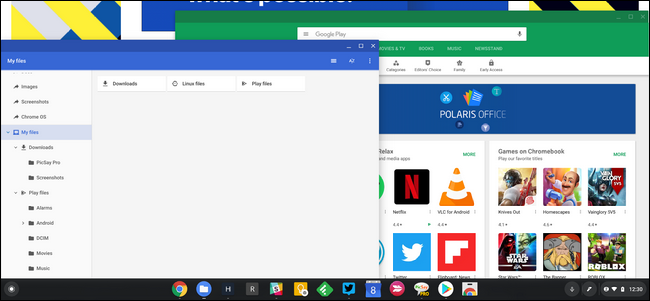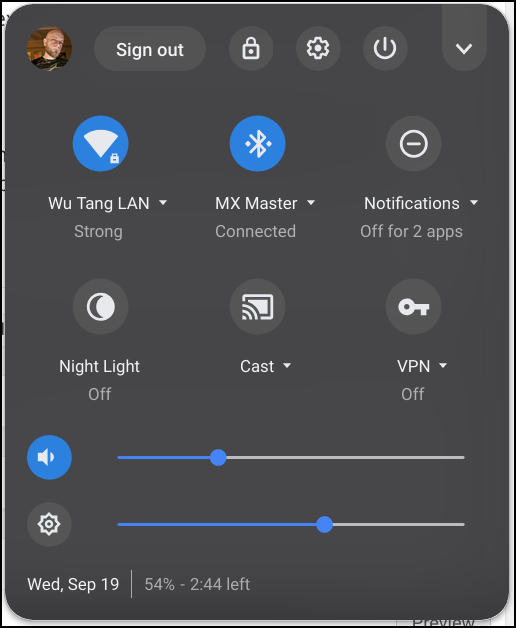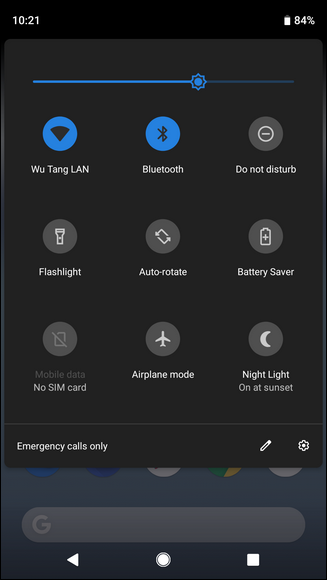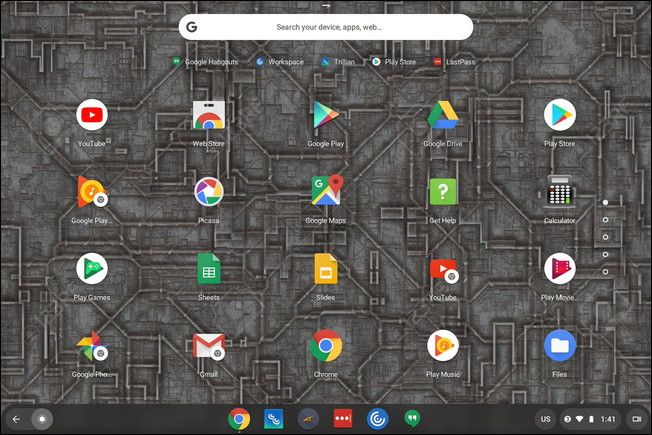Quick Links
A supposed merge of Android and Chrome OS has been rumored for years---to the point where some people believe one will eventually replace the other. That's not what's really going to happen---but the two are joining forces.
This started with the introduction of Android apps into Chrome OS, which was a massive leap forward for the platform---but it was also just the beginning of this "combining" of operating systems. Chrome OS as we have known it for years is changing dramatically.
Android Is the Future, but It's Running Parallel with Chrome OS
It's clear that Google's future is still with Android, and now it's pushing Chrome OS in that direction. Android is not replacing Chrome OS, nor is Chrome OS replacing Android. But the two will absolutely and undoubtedly work in tandem moving forward.
The biggest changes to Chrome OS are happening now. Chrome OS 69---which just hit the stable channel---is starting to show the direction Google is moving. Chrome OS features a new overall look with a material design theme, bringing it very close to what you find on Android.
Chrome OS 70 ---which is still in beta---makes the direction even clearer. Chrome OS---not Android---is the tablet OS of Google's future. We've already seen one Chrome OS tablet come to market in the Acer Chromebook Tab 10, which is admittedly for the education and not the consumer market. The HP Chromebook x2 detachable offers another tablet-style product.
With rumors of a possible new Chrome OS tablet coming at Google's October 9th event, it's all but confirmed: Android tablets are dead, and Chrome OS tablets will be the new thing moving forward. This is an excellent decision on Google's part because it brings to market everything most people want from a tablet: a laid-back tablet experience when you want it and a full productivity machine when you need it.
Sure, you could argue that the Surface Go/Pro and iPad already exist. However, while the Surface excels for productivity, it's not as good as a tablet. The iPad, on the other hand, is a great tablet, but not the best for productivity. Chrome OS tablets will eventually be able to offer the best of both worlds in a way that makes perfect sense: Android apps for the tablet experience, with Chrome and Linux apps for productivity.
Case in Point: A Closer Look at Chrome OS 70 (and What it Shows About the Future)
While Chrome OS 69 gives a glimpse into a new look, the real changes are in Chrome OS 70, which is currently available in the developer channel. For example, let's take a look at the system menu.
That is decidedly Android. For comparison, here's a look at the notification shade and quick settings panel on stock Android Pie.
It's basically the same thing. Also, the button shapes are different in Chrome OS 70. Instead of the traditional squared off buttons found in previous versions of Chrome OS, they have been replaced with rounded, pill-shaped buttons. Again, this is more in-line with Android's recent look.
Further, check out the launcher in Chrome OS 70.
While it looks pretty similar to how it did in 68, it's wider and more spaced out now. It also shows recently used apps in the top row, along with the rounded search bar. Again, these were both present in 68 (and below), but they've been styled to look much like the stock launcher on the Pixel phones.
Another of the biggest changes in Chrome OS 70 comes in tablet mode. On convertibles, as soon as you flip it into tablet mode, the primary interface changes pretty dramatically.
The app drawer essentially becomes the home screen---quite similar to what you'd see on an iPad. While this change has proven polarizing (I hate it), the direction makes sense: quick access to apps when using the device like a tablet. Of course, there's always a chance that this could change before 70 hits the stable channel and it's just something currently being tested, though that's probably unlikely.
This new interface raised one primary question for me: is this all that will be available on Chrome OS tablets? If that's the case, it completely negates the "best of both worlds" pitch I threw earlier, because it eliminates the primary meat of the OS in exchange for a better tablet experience.
But here's the thing: Google incorporated a brilliant change in Chrome OS 70 for tablets. As pointed out by Chrome Unboxed (which is a fantastic resource if you're interested in keeping up with Chrome OS news), when you connect an external mouse or keyboard to a Chrome OS tablet running version 70, it automatically switches out of tablet mode and into "desktop" mode. Check it out:
As Chrome OS tablets become more prolific---especially if the rumored "Nocturne" tablet is indeed legitimate---this will be the game-changing feature that separates them from the Surfaces and iPads of the world. It's a tablet, sure, but it's also a laptop. Or a desktop if you have a dock. It's a one-and-done, do everything machine---within reason, of course.
But what about when you're in tablet mode and need to bang out a quick email? Connecting a keyboard just to type a few words doesn't make a lot of sense, but keyboards on tablets are notoriously awful---they're just cumbersome and unwieldy because they're so damn big.
Chrome OS 70 has a fix for that too. In 70, when the device is using the tablet interface, you can undock the keyboard and float it around the screen, making it a lot easier to type on. Or type with one hand. It's little changes like this that just make so much sense.
Similarly, Chrome OS 69 introduced a new system-wide voice dictation system. This places a new microphone button next to the system tray that works anywhere in the operating system, independently of the software or hardware keyboards. Simply tap the button and start talking---Google excellent voice dictation will do the rest. I wrote this paragraph using the feature.
Note: This feature has to be enabled in Settings > Accessibility > Enable Dictation.
All this is to say one thing, really: Android and Chrome OS are joining forces, but one will not replace the other. Chrome OS is stealing a lot of Android's features, but it's still very much its own OS. In a way, Chrome OS is becoming Google's MacOS and the Pixel its iPhone. Not only should you expect to see Chrome OS adopt more Android features in the future, but we'll likely see deeper integration of the two platforms, giving Android users more of a reason to also choose Chrome OS.




